Japanese Tattoo Symbols: Meaning and Significance
Introduction
Japanese tattoo symbols are rich in history and meaning, often reflecting cultural heritage and personal values. These intricate designs have captivated the hearts of many tattoo enthusiasts worldwide. Whether you are considering getting a Japanese tattoo or simply fascinated by their beauty, understanding the significance behind these symbols can deepen your appreciation.
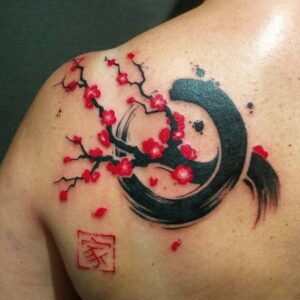
The History of Japanese Tattoo Symbols
Origins and Evolution
Japanese tattoo symbols, known as “To insert ink,” have ancient roots dating back thousands of years. Initially used for spiritual and decorative purposes, these tattoos evolved to signify social status, membership in certain groups, and personal achievements. Over time, Japanese tattoo art has developed into a highly respected and intricate form of body art.
Cultural Significance #Japanese Tattoo Symbols
Each Japanese tattoo symbol carries profound cultural significance. These symbols are not just decorative; they tell stories, convey beliefs, and represent the wearer’s identity. Understanding the cultural context of Japanese tattoo symbols is essential to appreciating their depth and beauty.
Popular Japanese Tattoo Symbols and Their Meanings
Dragon (龍, Dragon)
The dragon is one of the most iconic Japanese tattoo symbols, representing strength, wisdom, and protection. In Japanese mythology, dragons are considered benevolent creatures that bring good fortune and ward off evil.
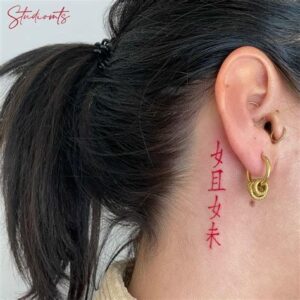
Koi Fish (鯉, Koi) #Japanese Tattoo Symbols
Koi fish tattoos symbolize perseverance, ambition, and success. The koi’s journey upstream is seen as a metaphor for overcoming life’s challenges and achieving one’s goals.
Phoenix (鳳凰, Phoenix)
The phoenix is a symbol of rebirth, immortality, and renewal. This mythical bird is often depicted rising from flames, representing the ability to overcome adversity and emerge stronger.
Tiger (虎, Tora)
Tiger tattoos represent courage, power, and protection. In Japanese culture, tigers are believed to ward off evil spirits and bring strength to the wearer.
Cherry Blossom (桜, Sakura) #Japanese Tattoo Symbols
Cherry blossoms are a symbol of the transient nature of life and the beauty of impermanence. These delicate flowers remind us to appreciate the fleeting moments and the cyclical nature of existence.
Geisha (芸者, Geisha)
Geisha tattoos embody grace, beauty, and artistry. These tattoos pay homage to the traditional Japanese entertainers known for their skills in music, dance, and art.
Envy Spirit Mask (般若, Envy Spirit)
The envy spirit mask is a powerful symbol representing female rage and jealousy. It is often depicted in a dramatic and fearsome manner, reflecting the complex emotions and inner struggles of humanity.
Lotus Flower (蓮, Lotus) #Japanese Tattoo Symbols
The lotus flower symbolizes purity, enlightenment, and spiritual growth. Emerging from the muddy waters, the lotus represents the journey of rising above challenges to achieve spiritual awakening.
Oni Mask (鬼, Oni)
Oni masks depict demons or ogres from Japanese folklore. These tattoos symbolize protection from evil spirits and the darker aspects of human nature.
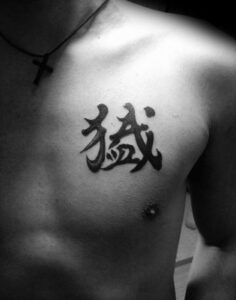
The Artistry of Japanese Tattoo Symbols
Intricate Designs and Techniques
Japanese tattoo symbols are renowned for their intricate designs and detailed artistry. Traditional techniques, such as hand engrave (hand-poked tattooing), are still practiced today, preserving the authenticity and craftsmanship of this ancient art form.
Color and Composition
Color plays a crucial role in Japanese tattoos. Bold and vibrant colors bring the symbols to life, while careful composition ensures that each element harmonizes within the overall design.
Choosing the Right Japanese Tattoo Symbols
Personal Significance
When choosing Japanese tattoo symbols, consider their personal significance to you. Each symbol carries its unique meaning, and selecting one that resonates with your values and experiences can make your tattoo more meaningful.
Cultural Respect and Appropriation
It’s essential to approach Japanese tattoo symbols with cultural respect and awareness. Understanding the cultural context and significance of these symbols can help avoid cultural appropriation and ensure your tattoo is a respectful homage to Japanese heritage.
The Process of Getting a Japanese Tattoo
Finding a Skilled Artist
Finding a skilled tattoo artist experienced in Japanese tattoo symbols is crucial. Look for artists who specialize in traditional Japanese tattooing techniques and have a portfolio that showcases their expertise.
Consultation and Design
During the consultation, discuss your ideas and preferences with the artist. They can help you choose the right symbols and create a custom design that reflects your vision while staying true to traditional Japanese tattoo art.
Tattoo Aftercare
Proper aftercare is essential to ensure your Japanese tattoo symbols heal well and maintain their vibrancy. Follow your artist’s instructions on cleaning, moisturizing, and protecting your tattoo during the healing process.
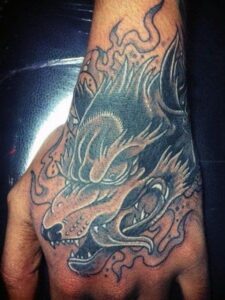
Japanese Tattoo Symbols in Modern Culture
Influence on Western Tattoo Art
Japanese tattoo symbols have significantly influenced Western tattoo art. Many tattoo enthusiasts around the world admire and adopt these symbols for their beauty and deep meanings.
Celebrity Endorsements
Several celebrities have popularized Japanese tattoo symbols, showcasing them in media and fashion. This has contributed to their widespread recognition and appreciation.
Preserving the Tradition of Japanese Tattoo Symbols
Respecting the Craft
Preserving the tradition of Japanese tattoo symbols requires respecting the craft and the artists who practice it. Supporting skilled tattooists and valuing their expertise helps maintain the integrity of this ancient art form.
Cultural Exchange and Education
Promoting cultural exchange and education about Japanese tattoo symbols can foster greater appreciation and understanding. Learning about the history, meanings, and techniques behind these symbols enriches the tattooing experience.
FAQs
1. What do Japanese tattoo symbols represent?
Japanese tattoo symbols represent various qualities, beliefs, and stories. Each symbol carries its unique meaning, often reflecting cultural heritage and personal values.
2. Are Japanese tattoo symbols popular worldwide?
Yes, Japanese tattoo symbols are popular worldwide. Their intricate designs and profound meanings have captivated many tattoo enthusiasts globally.
3. How do I choose the right Japanese tattoo symbols for me?
Choose Japanese tattoo symbols that resonate with your personal experiences, values, and aspirations. Consulting with a skilled tattoo artist can also help you make the right choice.
4. What is the significance of the Envy Spirit mask in Japanese tattoo symbols?
The envy spirit mask represents female rage and jealousy, depicting complex emotions and inner struggles. It is a powerful and dramatic symbol in Japanese tattoo art.
5. Can I get a Japanese tattoo symbol if I am not Japanese?
Yes, but it’s essential to approach Japanese tattoo symbols with cultural respect and understanding. Learning about their meanings and significance ensures your tattoo is a respectful homage to Japanese heritage.
The Spiritual and Philosophical Aspects of Japanese Tattoo Symbols
Symbolism in Japanese Culture
Japanese tattoo symbols often carry spiritual and philosophical meanings. For example, the koi fish is not just a symbol of perseverance but also of transformation and personal growth. The koi’s journey upstream against the current is a metaphor for the human struggle against adversity and the pursuit of higher goals.
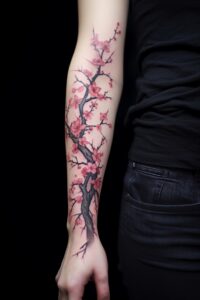
Influence of Zen Buddhism
Zen Buddhism has a significant influence on Japanese tattoo art. Symbols like the lotus flower and the enso (a circle drawn in one or two strokes to express a moment when the mind is free to let the body create) are deeply rooted in Zen philosophy. These symbols represent enlightenment, the universe, and the interconnectedness of all things.
The Role of Color in Japanese Tattoo Symbols
Traditional Color Schemes
Traditional Japanese tattoos, or To insert ink, often use a specific palette of colors, each with its own meaning. Red can symbolize strength and passion, while blue can represent calmness and stability. The use of bold, vibrant colors helps to bring these symbols to life and add to their visual impact.
Modern Adaptations
While traditional colors are still popular, modern Japanese tattoo art has embraced a broader spectrum of hues. This allows for more personalized and contemporary interpretations of classic symbols, blending tradition with modern aesthetics.
The Process of Hand carve Tattooing
What is Hand carve?
Hand carve is the traditional Japanese method of tattooing by hand. Unlike machine tattooing, hand carve involves the use of a wooden or metal stick with needles attached, which the artist manually taps into the skin. This method requires immense skill and precision, resulting in deeply saturated and smooth tattoos.
Benefits of Hand Carve
Many enthusiasts believe that hand carve tattoos have a unique depth and texture that machine tattoos cannot replicate. The process is also often less painful and results in faster healing times. However, finding a skilled hand carve artist can be challenging, as this technique is becoming rarer.
Japanese Tattoo Symbols and Identity
Personal Stories and Journeys
For many, Japanese tattoo symbols are a way to express personal stories and journeys. Each symbol can represent a milestone, a personal belief, or a tribute to someone important. These tattoos become a permanent narrative on the skin, offering a unique way to share one’s life story.
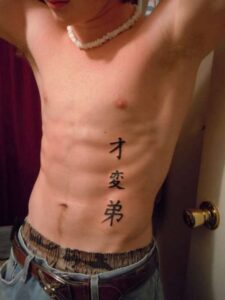
Connection to Heritage
For those of Japanese descent, these symbols can be a way to connect with their cultural heritage. Tattoos like the geisha, samurai, or traditional family crests (House crest) serve as reminders of one’s roots and the values passed down through generations.
Common Misconceptions About Japanese Tattoo Symbols
Cultural Appropriation
A common misconception is that non-Japanese people should not get Japanese tattoos. While cultural respect is crucial, understanding the meanings and showing appreciation for the art form is generally accepted. It’s important to approach these symbols with knowledge and respect, avoiding superficial or offensive interpretations.
Meanings Lost in Translation
Another misconception is that the meanings of these symbols are universal. The cultural context is essential, and a symbol’s meaning can vary significantly based on its depiction and usage. Consulting with a knowledgeable artist can help ensure the tattoo is meaningful and accurately represents its intended symbolism.
Famous Japanese Tattoo Artists
High Engraving
High Engraving, also known as Takahiro Kitamura, is a renowned Japanese-American tattoo artist known for his traditional Japanese designs. His work combines traditional to insert ink techniques with modern tattoo artistry, making him a respected figure in the tattoo community.
Shige
Shigenori Iwasaki, commonly known as Shige, is another prominent Japanese tattoo artist. His intricate and dynamic designs often feature traditional symbols like dragons and koi fish, brought to life with incredible detail and vibrant colors.
Cultural Exchange Through Tattoo Art
Global Influence
Japanese tattoo symbols have influenced tattoo art worldwide. Artists from various cultures incorporate these designs into their work, creating a fusion of styles that enriches the global tattoo community. This cultural exchange promotes a deeper understanding and appreciation of Japanese art.
Preserving Traditional Techniques
As Japanese tattoo symbols gain popularity globally, there’s also a movement to preserve traditional techniques. Workshops, apprenticeships, and cultural exchanges help keep these ancient practices alive, ensuring they are passed down to future generations.
Legal and Social Aspects of Japanese Tattoos
Tattoo Regulations in Japan
In Japan, tattoos have a complex history and are often associated with the Yakuza (Japanese organized crime). This has led to social stigma and strict regulations in certain areas. However, attitudes are slowly changing, with more people appreciating tattoos as an art form.
Acceptance in Modern Society
In modern society, Japanese tattoo symbols are gaining acceptance, especially among younger generations. Public perception is shifting towards recognizing tattoos as expressions of individuality and art, rather than symbols of rebellion or criminality.


